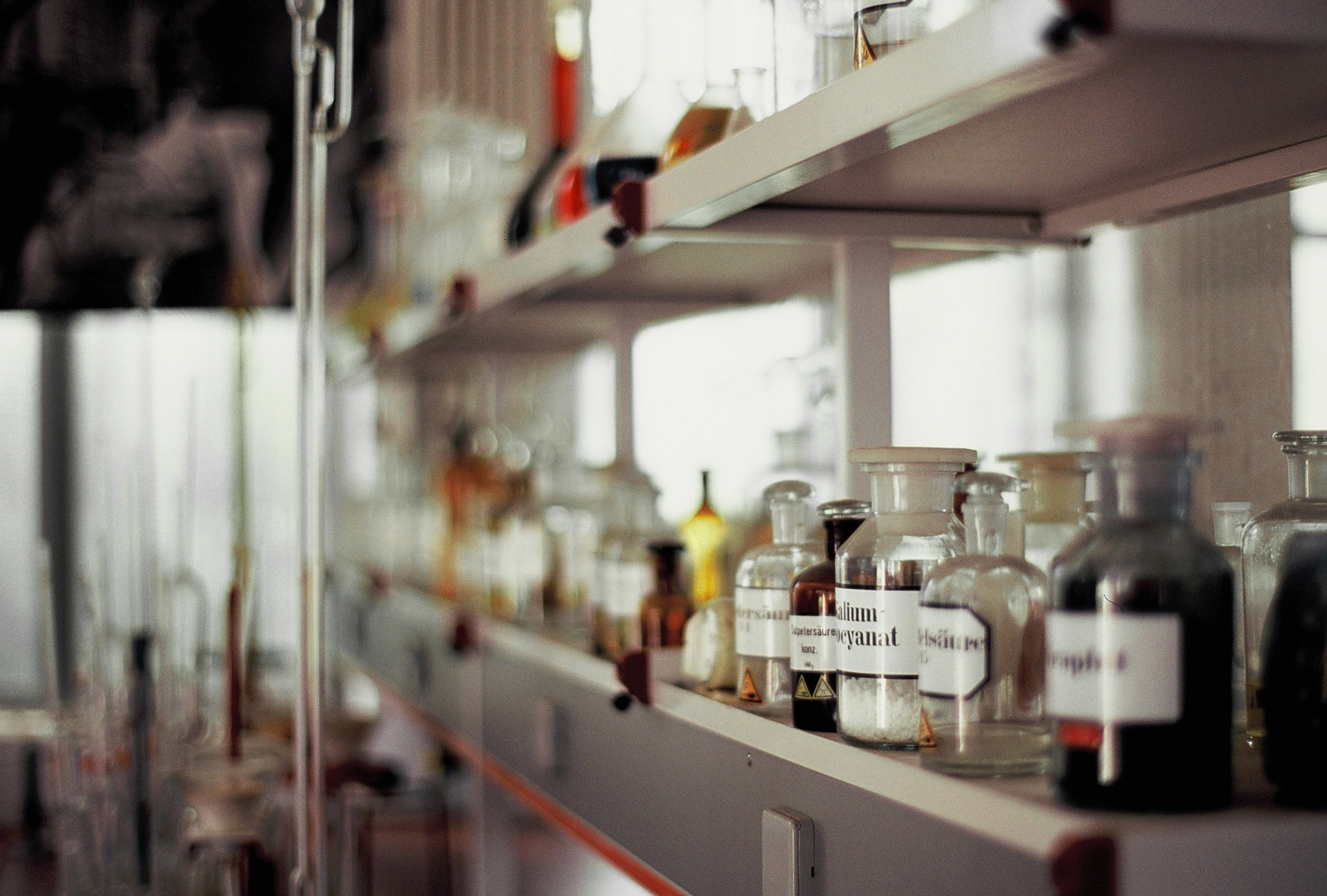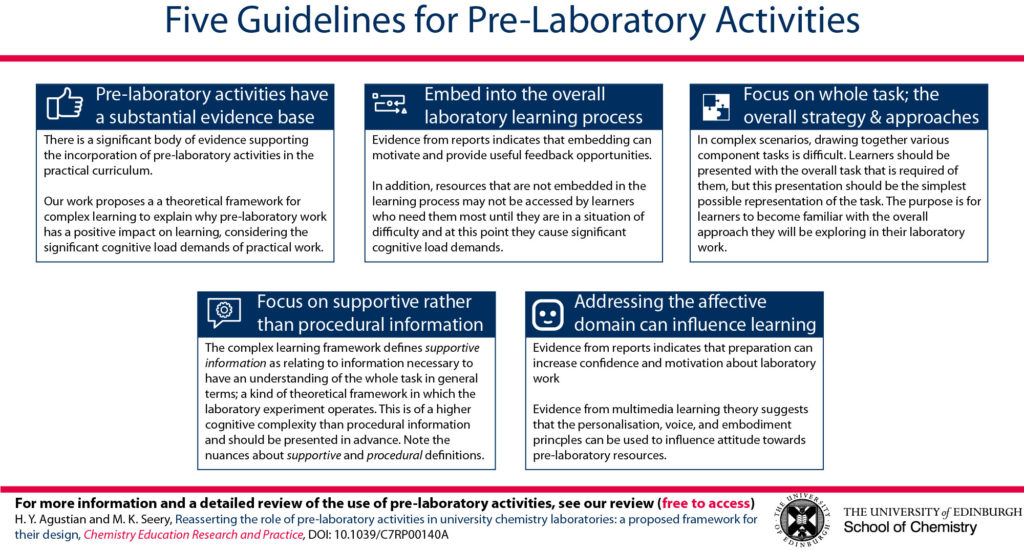In from the cold
After a long time in the wilderness,[1, 2] it feels like laboratory education’s time has come. It’s not that we don’t know about the importance of labs. Typically journal papers on learning in the laboratory start off with the same opening gambit regarding the importance of laboratory work in chemistry and that this importance is reflected by professional bodies such as the Royal Society of Chemistry and the American Chemical Society. But in her excellent editorial in Journal of Chemical Education in February this year, Stacey Lowery Bretz challenged chemists to bring some data to the table.[3] What is it about labs that mean their position in chemistry is paramount, and how do we know that? Indeed, how do we justify their existence (and cost)? She writes:
Chemists can no longer afford to believe that the importance of teaching laboratories is a truth we hold to be self-evident. As scientists we must support our research claims with evidence. Our claims about student learning require this same standard.
Labs are a busy place
There are lots of issues regarding laboratory education, but one of the core challenges is that labs are very busy places that place a large cognitive demand on learners. Writing in 1982, Alex Johnstone described the various bits of information learners are exposed to in a typical laboratory setting. Because of time pressures and the fact that assessment is typically of the lab report rather than of the lab work, Johnstone states with typical pragmatism that it is no surprise students surf through laboratory classes aiming to get whatever information is required for the real work of writing the report after the lab.[4] More recent work by Brittland DeKorver and Marcy Towns illustrate that this perception holds true among students in early [5] and late stages [6] of university teaching; important findings given their focus on the student perspective. So we have a problem. Labs are an expensive place, and there is not much evidence of learning.
Preparing for learning
Johnstone was not a man to identify a teaching concern without proposing a solution, and his solution to information overload in labs was to provide some of that information in advance. Chemists across the land will be familiar with pre-labs. The pedagogic argument for their use is that they help students do some advance preparation for some aspect of the lab. So far, so clear. But recently we attempted to answer the question – “what makes a good pre-lab” – and found it quite difficult to answer. Should we present some theoretical information in advance? Or should it outline practical procedures? To try to develop an answer, we surveyed 45 years of literature on pre-labs.[7] This threw up some fantastic approaches – imagine the effort required to make a lab video in the early 1970s! But while the approaches became more nuanced as the decades went by, most reports focussed on what approach was used (typically presenting theory or presenting experimental), but not really why that approach was adopted.
That matter aside, for a moment. There were a couple of clear messages from our review. Without exception, some 60 reports we surveyed over the last five decades reported that pre-labs were A Good Thing. Studies reported improved performance in labs in terms of time on task, yields of reaction, competency in performance, understanding of topic, ability to explain, motivation, interest and engagement… the list goes on. Pre-labs are A Good Thing.
The Ideal Pre-Lab
So pre-labs are A Good Thing. But what would an ideal pre-lab look like? We opted to frame the laboratory as an environment known in the educational psychology literature as a complex learning environment. [8] Yes, it is difficult because of the amount of information, but it is also difficult because learners need to draw together different types of information in one setting and apply knowledge in that real setting – this is adding complexity. The complex learning environment turns out to be a useful framework because information that is necessary to support learning in complex learning environment has been described. These are termed supportive information (core underpinning materials needed to understand general approaches been taken and why) and procedural information (information necessary to carry out tasks such as experimental procedures, routine data analysis, etc). Working in a complex learning environment is best supported if supportive information is provided in advance and preocedural information is presented just in time as needed. We used our review and aligning leaning in the lab with the complex learning framework to devise five guidelines for designing pre-lab activities.
Current research and revisiting your own pre-labs
We’ve been taking the findings from this work and implementing it in our own lab courses in physical chemistry. In fact at higher stages, we believe that pre-labs are so important, we have arranged the curriculum so that a full lab class acts as a pre-lab to an investigative part, described in our recent “Unfinished Recipes” paper. [9] Other recent work by Marcy Towns is taking another angle on this and I think is really exciting. [10] They are thinking about labs in terms of how they enable science practices, and have written a useful paper on translating typical pre-lab questions that are pretty generic to those which prompt students to start thinking critically about their lab work before they begin (and also afterwards, in post-lab work). They provided some useful examples, showing how to incorporate what/why/how questions, but also asking students to think about research questions the lab may answer, as well as compare appropriate techniques and considering their value. Addressing these in advance, students are beginning to think of the big picture of the lab and their activities in it. They relate this approach to our concept of providing supportive information in advance of lab work.
Give Up Yer Aul… Pre-Labs
So look over your pre-lab activities. What are they asking students to do? How will they directly support learning in the lab and how do they explicitly support student understanding of the “big picture” of the experiment being conducted?
Pre-labs are A Good Thing. So it is time to rethink our pre-labs.
References
- Hofstein, A. and V.N. Lunetta, The role of the laboratory in science teaching: Neglected aspects of research. Review of educational research, 1982. 52(2): p. 201-217.
- Hofstein, A. and V.N. Lunetta, The laboratory in science education: Foundations for the twenty-first century. Science Education, 2004. 88(1): p. 28-54.
- Bretz, S.L., Evidence for the Importance of Laboratory Courses. Journal of Chemical Education, 2019. 96(2): p. 193–195.
- Johnstone, A.H. and A.J.B. Wham, The demands of practical work. Education in Chemistry, 1982. 19(3): p. 71-73.
- DeKorver, B.K. and M.H. Towns, General Chemistry Students’ Goals for Chemistry Laboratory Coursework. Journal of Chemical Education, 2015. 92(12): p. 2031-2037.
- DeKorver, B.K. and M.H. Towns, Upper-level undergraduate chemistry students’ goals for their laboratory coursework. Journal of Research in Science Teaching, 2016. 53(8): p. 1198-1215.
- Agustian, H.Y. and M.K. Seery, Reasserting the role of pre-laboratory activities in chemistry education: a proposed framework for their design. Chemistry Education Research and Practice, 2017. 18: p. 518-532.
- van Merrienboer, J.J.G., P.A. Kirschner, and L. Kester, Taking the Load Off a Learner’s Mind: Instructional Design for Complex Learning. Educational Psychologist, 2003. 38(1): p. 5-13.
- Seery, M.K., et al., Unfinished Recipes: Structuring Upper-Division Laboratory Work To Scaffold Experimental Design Skills. Journal of Chemical Education, 2018. 96(1): p. 53-59.
- Rodriguez, J.-M.G. and M.H. Towns, Modifying Laboratory Experiments To Promote Engagement in Critical Thinking by Reframing Prelab and Postlab Questions. Journal of Chemical Education, 2018. 95(12): p. 2141-2147.
(Flickr (Markus Kniebes), Public Domain)



